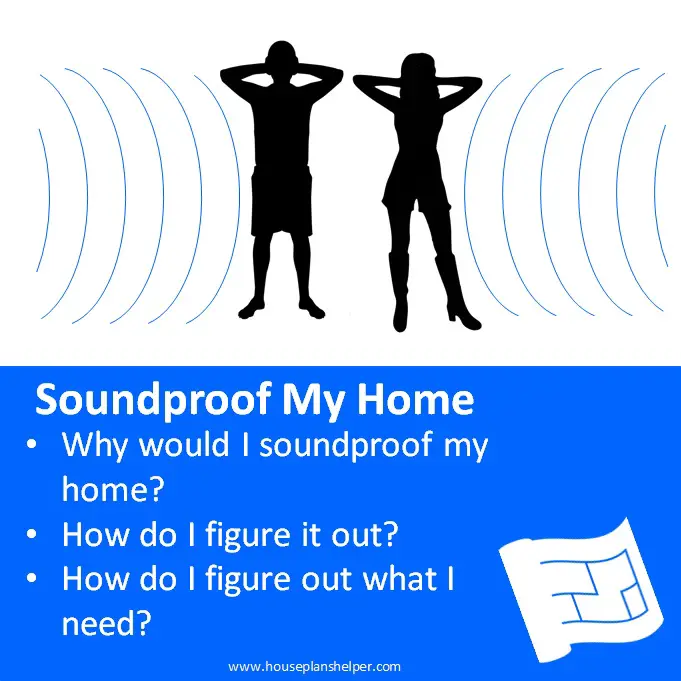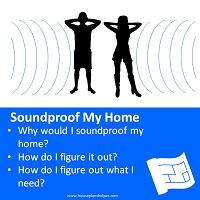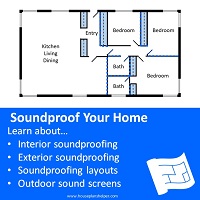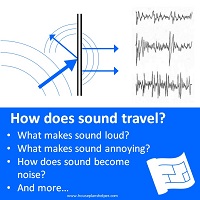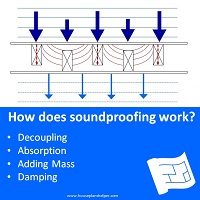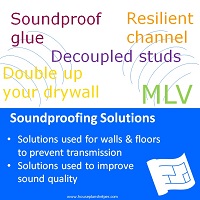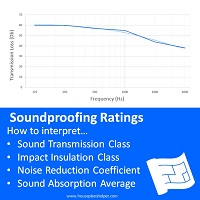- Home
- Soundproofing
Should I Soundproof My Home?
So, are your asking yourself 'Should I soundproof my home?'
Soundproofing may not be the first thing on your mind when you're thinking about the design of your home.
You’ll be spending lots of time and energy on the layout and interior of your home and I want to encourage you to consider the quality of sound in your home as well. There’s no point having a home that looks fantastic if the experience of living in it is spoiled by annoying noise.
So, let me offer you some sound advice – consider how much of a luxury peace and quiet is to you, and if it’s important to you then the answer may well be, 'Yes, I want to soundproof my home.'

Standard construction is not good sound insulation
Standard wood frame construction, calls for 2x4 studs and ½ inch drywall, which does not offer good sound insulation. This is what makes your walls sound ‘paper thin’.
Standard floor construction of joists, sub-floor and drywall also does not offer great sound insulation.
With standard construction, your someone walks across the floor, or someone is playing music in the next room, you’re going to hear it.
This section has some pages which should be read before others. It's worth starting with 'How does sound travel?' and 'How does soundproofing work?' to get the basics.
Then I'd move on to soundproofing ratings and soundproofing regulations.
After that you can dive in to soundproofing solutions.
When you start your research on soundproofing, you will come across lots of soundproofing companies offering various soundproofing solutions. Lot’s of this information is good information about good products, but it is always slightly biased towards the solution (or solutions) that are offered by any individual sound proofing company.
Did you know that many of the most effective and lowest cost soundproofing solutions can be made by taking sound into account in the layout of your home? Then if further sound insulation is required, your builder can do this for you with materials they can easily get hold of. You just need to know what soundproofing to specify and include what you want in your plans.
The good news is that many of the initiatives to control noise in your home will often also go hand with hand with improving the energy efficiency and fire safety of your home. They’ll also make your home feel better quality, and more solid, just from the quality of the sound.
Why would I soundproof my home?
If you’re already living in your home that you intend to remodel, you will already have an idea of whether or not you want to reduce the noise or improve the sound quality in your home.
If you’re building a new home it may be really obvious you’ll need home sound insulation because your site is near a noisy road, rail track or an airport, then there’s any sound where the source is from a neighboring home, or from your home.
How do I figure out whether or not I want to soundproof my home?
Noise can originate from three sources:
- Outdoors
- From a neighbor
- Inside your own home – in the form of noise from another space, or noise reverberating round a space.
It's a question of assessing the sounds outside and within your home and working out if they are annoying or not.
Sources of outdoor noise
Is your home in a location where there are any undesirable noises? Let's have a look at some of the sources of noise from outdoors.
- Transportation related - Busy road, train track or flight path.
- Weather related - wind, heavy rain or hail.
- Neighboring garden noise (kids playing or lawn mowers, leaf blowers).
- Pets (dogs, chickens)
- Farms or factories
- TV or music from neighboring homes
- Neighboring air conditioning units or swimming pool pumps
I have lived in homes that have had a few of these shortcomings. Personally, I find any noise that’s present nearly all the time harder to deal with than intermittent noise. A road that’s busy all the time is a constant drone that’s hard to get away from, although this does tend to calm down at night.

My experiences with noise pollution
Several experiences come to mind...
- When I was in college I lived in a student house that had a double whammy of noise from outside. My bedroom was at the front of the house which fronted onto a busy road. I noticed that the sound really traveled up to my window which was on the third floor. I guess the sound reflected off the road and off the buildings opposite. The good news is that this noise calmed down at night and didn't keep me awake.
It was also a terraced house and the next door neighbors played music late into the night which did sometimes wake me up. The solution when it got too much was to sleep in the living room which was quieter. If I owned the house, this situation would have been unacceptable and I would have looked to soundproof my home. - I lived in London for a year or so in South London. Most of London is under the flight path for Heathrow at some time or other. Airplanes are loud but it's an intermittent noise. Again, this house was a rented property. If I was to renovate it, I'd want to soundproof my home, particularly the windows as the there walls were brick and already pretty soundproof.
- In Canada we lived right next to a train track. And I mean right beside the track. It ran just behind the back garden and Canadian cargo trains are loooooooong. The trains only came by a few times a day and hardly ever at night. Since it was Canada, all the windows were double glazed and the house was well insulated so while the trains were certainly audible, it didn't interfere with having a conversation at home.
Sources of indoor noise
And now let's look at noises that might come from your own home, or from a neighbor. I'd want to soundproof my home if any of these were particularly loud.
- HVAC system and stand alone air conditioning units.
- Appliances in the kitchen and laundry.
- Vacuum cleaner.
- TVs and music systems.
- Pumps that make your power shower possible. These can be really noisy.
- Bathrooms can be noisy. Showering and (how do I put this delicately) peeing can both be quite loud, particularly in the room below if there's not much sound insulation in the floor and ceiling separating the two rooms.
- People and pets. For both kids and adults, play time and quiet time don't mix. Everyone in the family needs to feel comfortable about where they can play and shout and where they can go for a bit of peace and quiet.
Reader stories
Here's a few reader stories that might help you decide whether or not to soundproof your home.

Jane's kitchen cacophony
Jane is a mother of 6 and was lucky enough to have the opportunity to remodel their kitchen space to include a generous kitchen and big family dining space. The space worked brilliantly with a highly functional kitchen and plenty of space for a big table without anything feeling crowded. The new room had floor to ceiling glazing on two sides offering lovely views onto the garden, tiled floors and a flat, uniform ceiling.
The one problem – when the family were all in for dinner chatting away, Jane and her husband could hardly hear themselves think. They had a home sound insulation nightmare on their hands. Their beautiful room was designed with no regard for the effect that the space design and finishes would have on the sound of the space.
"Help - I need to soundproof my home!"
Jane had to call in an acoustic engineer to sort out the issue. The solution was several sound absorption boxes placed at strategic points on the ceiling, several pieces of fabric stretched over batons to hang on the walls (these actually looked pretty artistic) and installing some translucent blinds in front of the windows.

Sarah's whispering walls
Sarah had a beautiful curved eating niche built as an addition to the family kitchen. Immediately as the family first sat down to their first meal in the space the problem made itself obvious. Two seats at the table had everything they said echoed right back at them.
Drawing the curtains solves the problem, but that’s not practical during the day and besides would obscure the view to the garden.
Most of the time, they just avoid sitting in the two affected seats.
Fade out
I hope this has helped you answer the question, 'Should I soundproof my home?'. Have a look at the other information I've got for you on soundproofing.

